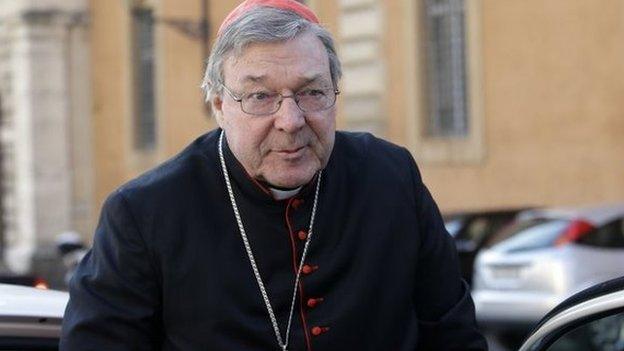Vatican reforms may be starting to bite
- Published
- comments
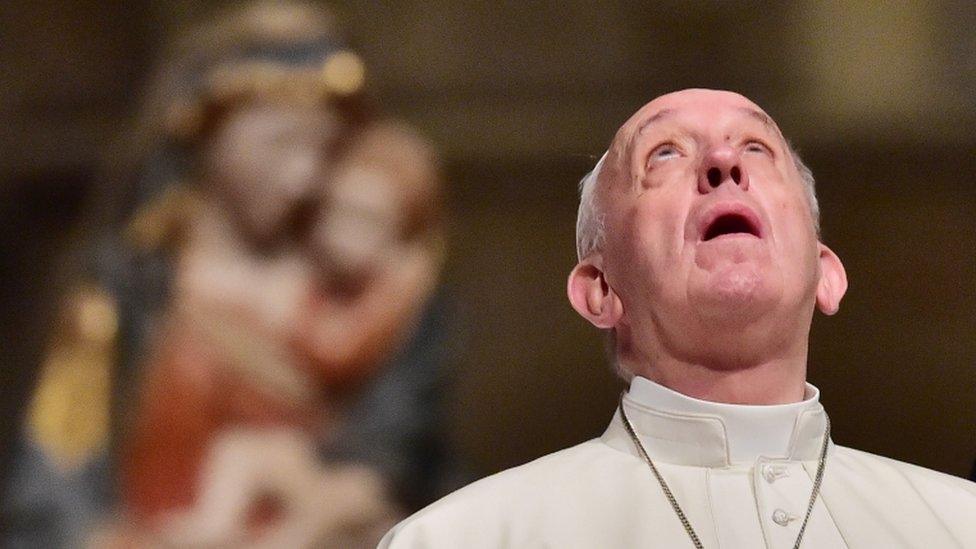
Pope Francis has signalled he is very serious about reform
The latest revelations of dirty dealings swirling around the Vatican have not only shown that the price of sainthood is high (around £350,000), but also the price that Pope Francis is paying for his attempts to reform Roman Catholic HQ.
As the CEO of a global organisation, whose mission statement is spreading the word of God and whose bottom line is saving souls, Pope Francis has called often for a "poor Church" that serves the poor.
His problem, though, is that the Church is not poor.
And in the past, the temptation to abuse the Vatican's coffers - and money donated by ordinary Catholics - has been too much for some of the Church's most senior servants to resist, with such dealings obscured until recently by a veil of secrecy.
Three years after the original "Vatileaks",, external in which the revelations of the then Pope Benedict's butler shook the Vatican, two new books based on leaked documents (Avarice by Emanuele Fittipaldi and Merchants in the Temple by Gianluigi Nuzzi, of Vatileaks fame) created headlines, external over the past week.
Their revelations of greed and mismanagement might not shock if they concerned the upper echelons of an international sporting organisation, but they will horrify many of the faithful with yet more evidence of cardinals' sins.
However, far from revealing that Pope Francis is presiding over new scandals, the leaks make abundantly clear the scale of the challenge that has been faced by those whom this Pontiff has tasked with cleaning up the Vatican's finances and past mismanagement.
Serious message
In comments that many will see as directed at his middle and senior managers who have not understood that Pope Francis is serious about reform - financial and spiritual - he told a meeting of bishops in Florence this week: "May God protect the Italian church from every pretence of power, image and money."
Among the disclosures in Nuzzi's latest book is the revelation that the cost of sainthood can run up to £350,000 or more.
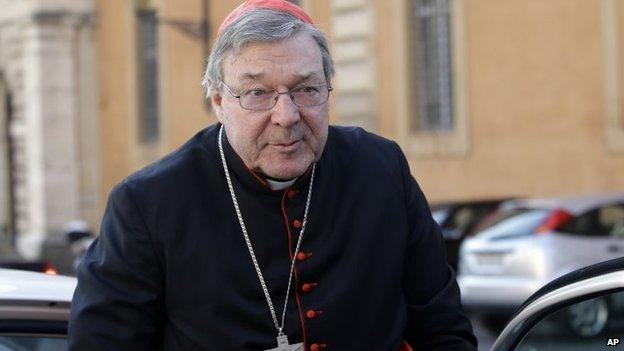
Cardinal Pell runs a new finance department
He also tells the story of a monsignor, Giuseppe Sciacca, who allegedly enlarged his own apartment by taking down his neighbour's wall while the priest was in hospital. Sciacca was demoted and forced to move out by Pope Francis.
Similar claims in Fittipaldi's book include the allegation that the former Vatican Secretary of State, Cardinal Tarcisio Bertone, used £140,000 destined for sick children towards the renovation of his apartment.
In response, Cardinal Bertone said he paid the bill himself and then that he had discovered the foundation had also settled it - even though he said he had never asked for that to happen. , external
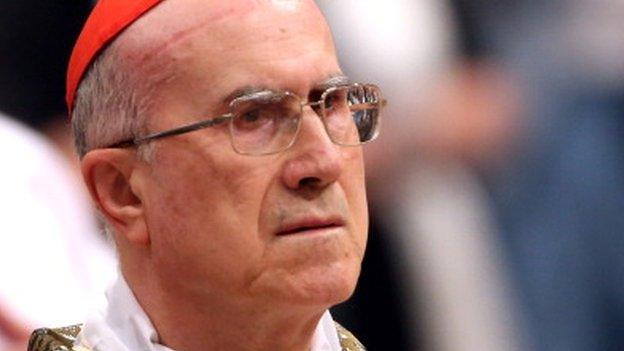
Cardinal Bertone allegedly misused funds to renovate his apartment
The author also claims that an even larger sum that had been destined for the needy from the "Peter's Pence" fund, from church collections around the world, was instead used to plug deficits in the Vatican's finances.
Secret recordings of the Pope were obtained by Nuzzi, although they also play to Francis's credit, revealing the Pontiff's dismay at the corruption that had gripped some parts of the Vatican, as well as his determination to get a grip on its finances and clean up a system whose opacity has protected the guilty in the past.
Nuzzi says that in a recording of a meeting in July 2013, Pope Francis tells the assembled clerics: "I am reminded of an elderly parish priest in Buenos Aires, a wise man who was very careful with money."
He said: "If we don't know how to look after money, which you can see, how can we look after the souls of the faithful, which you can't see?"
Dirty tricks
Although both authors claim to have published in the hope of helping Francis with his reforms, the Pope appeared less than delighted at the latest airing of the Vatican's dirty laundry beyond its walls.
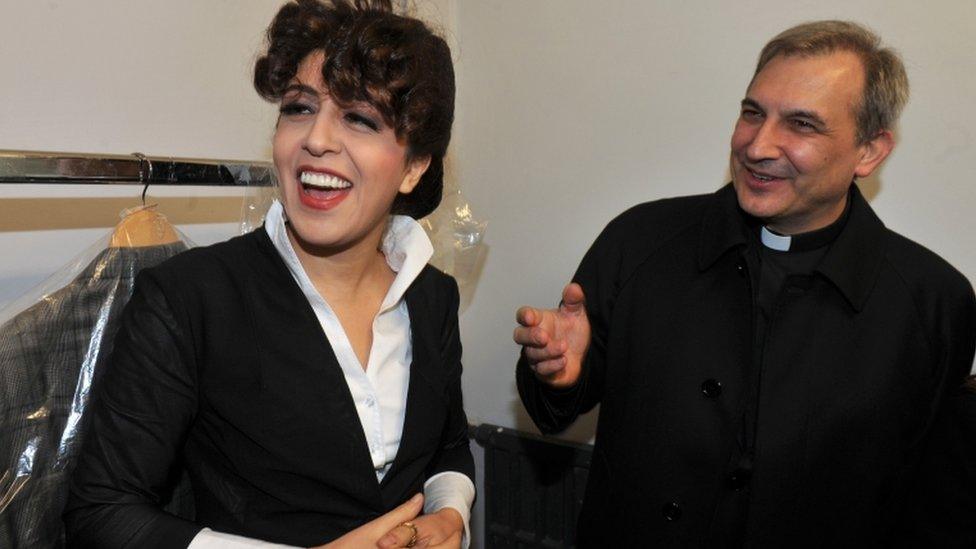
Francesca Chaouqui and Monsignor Lucio Angel Vallejo Balda were arrested
The Vatican's official response to the books included the threat of legal action against the authors, and the arrest by the Vatican police, external of a senior cleric, Monsignor Lucio Angel Vallejo Balda, and a PR woman, Francesca Choaouqui, for their alleged involvement in the leaking of confidential documents to the authors.
She has denied being responsible, and was released after co-operating with the investigation.
Both had been on the special commission set up by the Pope to investigate the Vatican's murky finances two years ago.
The revelations may well be shocking, but they are also proof, perhaps, that the Papal reforms are starting to hit where it hurts.
The attempts at imposing financial transparency and rigour within the Curia are making it harder for the misspending of Vatican funds to continue, or be kept secret, not least thanks to Rome's first independent auditor general, plus a new finance department led by the conservative Australian cardinal, George Pell.
On top of that, a supervisory Council for the Economy includes outside lay experts, external for the first time.

Lay members of the Council for the Economy:
Joseph Zahra: Economist and founding partner and Managing Director of MISCO, an independent consulting group operating in Malta, Italy and Cyprus.
Jean-Baptiste de Franssu: Chairman of Mergers and acquisitions advisory and consulting firm, INCIPIT.
John Kyle: Former vice-president of Imperial Oil Limited in Canada.
Enrique Llano Cueto: Economist from the University of Madrid and a chartered accountant.
Jochen Messemer: Former partner of McKinsey & Company, and International Auditor of the Prefecture for Economic Affairs of the Vatican and the Holy See since 2009.
Francesco Vermiglio: Professor of Business Administration at the University of Messina, Italy.
George Yeo: Former Singapore government minister.

Changing the culture of an unwieldy and change-resistant bureaucracy such as the Vatican, though, will not happen overnight and some in Rome fear that the latest leaks are all part of a "dirty tricks" campaign against a Pope who is determined to ensure that the Church hierarchy practises what it preaches.
Pope Francis once said that it hurt his heart to see a priest with the latest model of car.
"If you like the fancy one, just think about how many children are dying of hunger," he said.
These days in Rome, fancy apartments, ostentatious clerical vestments and top of the range cars are frowned upon at the highest level, for spiritual as well as financial reasons.
In Florence this week, Pope Francis continued to lead by example - choosing to eat lunch with the poor and lining up at a Caritas soup kitchen to eat soup with a plastic spoon.
He had told a newspaper not long before that "a believer cannot speak of poverty and the homeless but have the lifestyle of a pharaoh".
The would-be pharaohs of the Vatican have been warned.
- Published5 November 2015
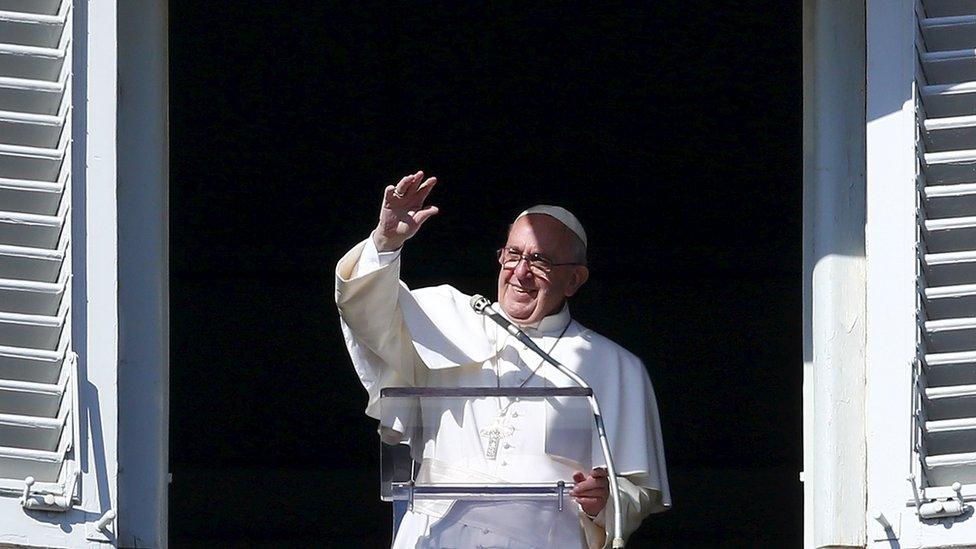
- Published5 November 2015
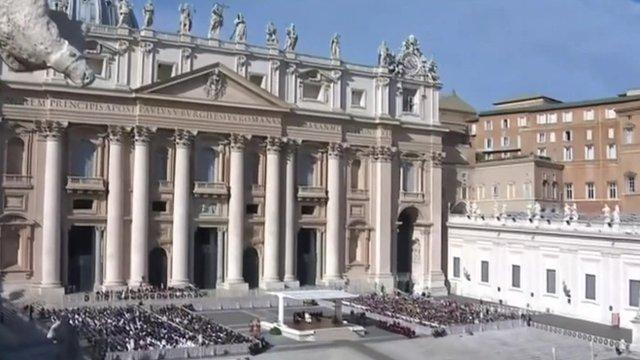
- Published2 November 2015

- Published1 June 2015
